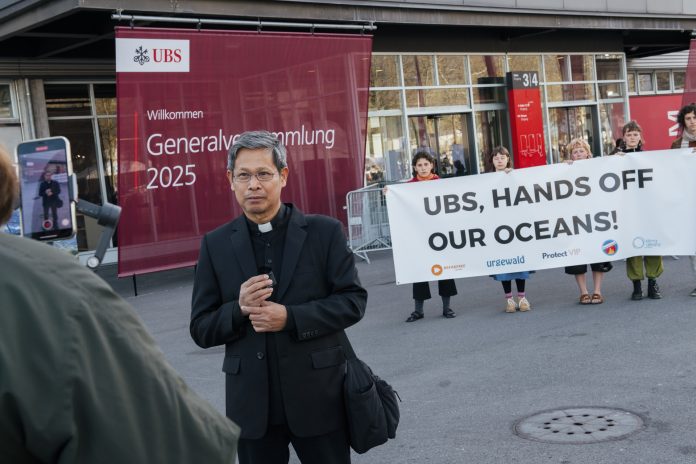A global alliance of environmental and human rights groups is demanding that Swiss bank UBS divest from fossil fuel projects in the Verde Island Passage (VIP), a critical marine biodiversity hotspot in the Philippines.
The call was made during UBS’s Annual General Meeting on April 10 in Lucerne, where Filipino Catholic priest and environmental advocate Fr. Edwin Gariguez addressed shareholders on behalf of Protect VIP, an international network pushing for the preservation of the marine corridor.
UBS is currently the second-largest European investor in San Miguel Global Power Holdings, the energy arm of San Miguel Corporation (SMC), with investments totaling USD 16.3 million. The bank ranks as the sixth-largest institutional investor in the conglomerate worldwide.
SMC is planning to build eight gas-fired power plants and a liquefied natural gas (LNG) terminal across the Philippines, three of which are set to be located within the Verde Island Passage.
Scientists and advocates have long warned that large-scale industrial activity in the area could severely threaten its rich marine biodiversity.
“This very ecosystem is now under threat, and the decisions made in this room directly contribute to this peril, impacting the lives and livelihoods of our people,” Gariguez told UBS shareholders.
“This is not the first time that we have come to you about Verde Island Passage, but despite the discussions, you have continued your investments with San Miguel Corporation. Now, you’re also complicit in the dirty deals of its allies Meralco and Aboitiz,” the priest added.
According to the priest, UBS has also served as a financial advisor to Meralco PowerGen Corporation and Aboitiz Power in a joint venture with SMC for the acquisition of SPPC and EERI—two gas power plants in Batangas—and an LNG import terminal.
The deal, which also involves power supply contracts with Meralco as the distribution utility, is facing legal challenges in the Philippines for allegedly breaching competition rules under the Electric Power Industry Reform Act.
The law prohibits utilities from sourcing more than 50% of their supply from affiliated companies—a limit reportedly exceeded in this case.
Climate advocates warned that SMC’s gas projects undermine the Philippines’ transition to clean energy. A study by Climate Analytics, commissioned by the Center for Energy, Ecology, and Development (CEED), concluded that the country has the potential to move toward near-total reliance on renewable energy.
“We ask the board and shareholders: how can you justify your continued investments in fossil gas when renewable energy is most viable, rapidly expanding, and a transformative alternative for the people and the climate?” the coalition said.
Gariguez also pointed to growing international pressure to protect VIP. In February, the United Nations Committee on Economic, Social, and Cultural Rights recommended that the Philippine government adopt stronger measures to safeguard the marine corridor as part of its human rights obligations.
“UBS is a huge, powerful, and formidable financial institution. But it is still accountable to international standards that align with global climate goals and the advancement of human rights,” Gariguez said. “The suffering of our communities and the disruption of our marine ecosystems in the Philippines must never be at the price of your pursuit of greater profit.”









